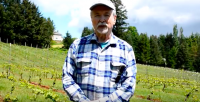May Member Spotlight: John Platt, hosting fundraiser and dinner at the beautiful Helvetia Winery in Hillsboro, OR this summer.
It is all About Clean, Clear, Cold Water

Ever wonder why Columbia Riverkeeper was founded 18 years ago? I asked John Platt, a founding board member, this very question.
You are a founder of Columbia Riverkeeper—can you share why you felt it was an important venture to launch?
I have worked for the Columbia River Inter-Tribal Fish Commission (CRITFC) for over 35 years. The tribes that are members of CRITFC consider water to be akin to a sacrament; it is the giver of life and it must be maintained in nature as a clear, clean, and cold element of existence on earth. In 1990, the Environmental Protection Agency (EPA) funded CRITFC to do both a survey of tribal fish consumption as well as a fish tissue analysis. The results indicated that tribal people on the Columbia ate almost ten times the amount of salmon as their non-Indian neighbors and that the salmon populations of the Columbia were absorbing an amount of toxins that were dangerous to Indian people in light of their consumption. Though tribes were pressing for stronger water quality protection by state and federal authorities, they needed more help.
In 2000, Bobby Kennedy, Jr. asked EPA Columbia River coordinator, Mary Lou Soscia, to arrange a meeting with Representative Elizabeth Furse, who had just finished three terms in the United States House of Representatives. At the Willamette Riverkeeper’s annual dinner that year, he asked her to help form a Columbia Riverkeeper. She enlisted the help of Thane Tienson and me and we sought the participation of Greg and Cyndi deBruler who headed Columbia River United. With the help of two young lawyers from Pace Law School, Aileen Roder and Tim Mooney who had worked with Bobby Jr., we formed Clean Water Columbia, an advocacy organization that eventually merged with Columbia River United to form the Columbia Riverkeeper.
The result has been a partnership between the tribes and the Columbia Riverkeeper that has proved to be a potent force preventing the development of new energy terminals poisoning the waters of the Columbia.
What do you think are the most important issues facing the Columbia today and what is Riverkeeper doing about it?
Ecosystem protection in the face of population growth and industrialization have been the most important issues facing the Columbia River water quality since non-Indian settlement began prior to the Civil War. Water pollution has and will continue to be a major issue, particularly with population growth. The exploitation of the Columbia as a navigation corridor for agricultural inputs and production, a source of water for irrigation and as a source of electrical energy has been superseded more recently by the quest for terminals for shipping American energy resources overseas. Along with the tribes, Columbia Riverkeeper has been a primary advocate for clean, clear, cold water in the face of these challenges.
The event you are hosting for Riverkeeper this year is a new twist on an annual event at Helvetia Winery. What should folks expect?
In 2003, we hosted one of Columbia Riverkeepers’ first fundraisers at Helvetia Winery. We have since held a number of annual fundraisers at the winery each August in support of the Fishers Memorial at Columbia Hills State Park. Since the Fishers Memorial effort is expanding its fundraising efforts, we are going back to our roots. On August 11, we will be holding a fundraiser for the Columbia Riverkeeper at the winery. The Wilbur Slockish family will be cooking salmon over an open fire on sticks and will be presenting traditional drumming and dancing. In addition, the Plan B Band will be providing contemporary music and there will be a few surprises as well. The event is Saturday, August 11 from 5:00 until 9:00 in the afternoon.
Check out this short video of John talking about the event:
I am sure there are a lot of stories, is there one you want to share?
Once the tribes completed the fish consumption survey and the results showed that tribal people consumed ten times as much fish as non-Indian citizens, the top brass at EPA realized that their obligation to protect tribes from toxic fish called into question current water quality toxic standards. They asked for a meeting with the tribal leaders in Washington, D.C. Unfortunately, the tribal leaders had an unexpected delay and I became the representative of CRITFC in a meeting with the managers of the EPA Division of Water. At the very beginning of the meeting, Betsy Sutherland, the director of the division, stated the problem and proposed an alternative to strengthening the toxics standard. She asked whether the Commission would issue a Fish Health Advisory asking the tribal people to eat far less fish. I responded, “Why don’t you give me a suitcase full of dynamite and I’ll blow up Bonneville Dam.” Noting the surprised looks on the faces and the gasps, I quickly added, “For me that would be a lot safer and easier than asking people of the treaty fishing tribes of the Columbia to limit their consumption of salmon.” The meeting ended soon after that and Oregon began the effort to change the toxics standard to protect tribal fish consumption. Though Oregon has changed its standard, it’s my understanding that Washington and Idaho are still dragging their feet.
Why are you still a member and supporter of Columbia Riverkeeper and why should others be too?
Threats to Columbia River water quality will only increase along with industrial development and population growth compounded by the effects of climate change. In addition to its advocacy for the protection of water quality on the Columbia, Columbia Riverkeeper sets an example of firm and honest advocacy and places a priority, just as the tribes did, on the supremacy of clean, clear, cold water.
Enjoy good company, music, food and wine while raising funds for clean water at Helvetia Winery in Hillsboro, OR.


